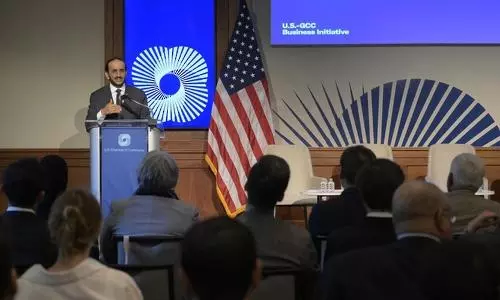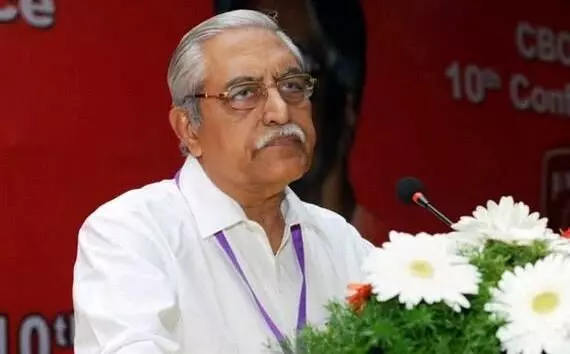
Privatising PSBs, a retrograde policy: AIBEA
text_fieldsFifty years after the nationalisation of banks, privatising them back is nothing but a retrograde reform, says CH Venkatachalam, general secretary of All India Banking Employees Association (AIBEA). In an interview with HW News, he added that banks were nationalised to reach out to rural areas of the country and supporting the weaker sections. He said that the government should be working for them rather than pleasing its corporate "bosses".
"In the presence of Additional Chief Labour Commissioner and Indian Bank's Association, we met the ministry officials and asked the reason for the new reform, and they didn't give an answer for that," Venkatachalam said. He added that the unions always supported most of the Centre's schemes like Pradhan Mantri Jan-Dhan Yojana, Demonetisation, PM SVANidhi, Mudra loans etc. because they wanted better service for the people.
Venkatachalam told HW News that for the progressive growth of the economy, people-oriented policies are needed. So, for various fields like rural development, agriculture, women empowerment, employment opportunities, health, education, exports, small scale business, everything needs support, and PSBs only did it. Private banks neither open branches in the rural area nor work for people's benefit since profit is their only policy.
When he was told that there are criticisms regarding efficiency due to the high number of non-performing loans (NPLs) in PSBs than private sector banks, he replied that PSBs give long term loans which private banks never. He also said that in PSBs, investments are low compared to the loans it provides. These long term loans are given in the people's interest, and the chances of NPLs can be high.
"Corporates are mostly the defaulters of PSBs. Now giving the entire banking sector to them seems ironical," he said. "What we need is more regulations. Defaulters should be penalised with criminal case procedures, rather than a civil case." He mentioned RBI's policy against wilful defaulters, and he said that civil case procedures proceeded on them aren't effective.
When asked about the lack of competition which affects PSBs' efficiency, "We are using people's money to do business. We are working for them," he said and added that thus the argument of competition is pointless.
Venkatachalam argued that private sector banks are prone to collapse, and there are many examples of that before the nationalisation of banks. "In 2008, when economies worldwide faced economic depression, PSBs in India were not affected since they were "insulated" to such adversities," he claimed.
"We are reaching all the political parties, customers and trade unions. Most of the Centre's opposition are supporting us. We will conduct more campaigns to inform people and protest against the reform," Venkatachalam said. "We are ready for discussions, dialogues. But rampant privatisation is not going to gather our support," Venkatachalam said and added that the union would cooperate with the government for anything in people's service.
The two-day protest organised by The United Forum for Bank Unions, an umbrella body for nine bank unions, against the Centre's new policy of privatising public sector banks (PSBs) went on all over the country from Monday. Ten lakh bank employees who attended it disrupted banking services all over the country. The government's policy of disinvestment of 1.75 lakh crore assets, which Finance Minister Nirmala Sitharaman announced in the budget, had garnered widespread discontent. She even said that it is not the government's job to run companies, for which Venkatachalam responded in the interview that it is the government's job to ensure the welfare of the country's citizens.
He didn't deny that the job security of the bank employees is also a reason behind their strike.
























